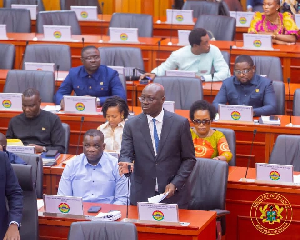The Commission on Human Rights and Administrative Justice (CHRAJ) have adopted a comprehensive multi-sectorial anti-corruption action plan to make the fight an integral part of the regular annual activities of public institutions.
“The control of corruption in Ghana should be the responsibility of each citizen; to join hands and tackle corruption in the country in order to secure and sustain the nation’s development.
“Build public capacity to condemn and fight corruption and make its practice a high-risk, low-gain activity,” Mr Joseph Whittal, CHRAJ Deputy Commissioner told the Ghana News Agency in an interview in Accra on Wednesday.
He explained that the National Anti-Corruption Action Plan (NACAP) was developed taking into account the limitations and shortcomings that characterized previous anti-corruption strategies.
He said the NACAP calls for collective action and sustained co-ordination of efforts, as well as the judicious application of resources of stakeholders to combat corruption.
Mr Whittal said the action plan constitutes the benchmark to assess the performance of stakeholders, especially government, in the fight against corruption.
He said the plan also goes beyond controlling corruption in the public sector, as it targets the private sector and embraces the activities of state and non-state actors, regardless of gender, age, local or international status.
The NACAP strategy focuses on corruption in the country, causes, effects and measures to control corruption. It also outlines measures for strengthening key anti-corruption and law enforcement agencies, improving investigation and prosecution.
Mr Whittal said the private sector is undoubtedly part of the corruption problem as it constitutes the supply side of the equation and fuels public sector corruption; “Yet the private sector is widely seen as the engine of growth and a critical partner in the anti-corruption struggle”.
He said the action plan therefore task professionals and regulatory bodies in the private sector to play a dynamic role in raising the awareness of the private sector about inculcating best business practices in their work, establishing and implementing code of business practices.
“The private sector must improve financial management procedures whilst adhering to good corporate governance systems,” he said.
He said civil society is also targeted to serve as anti-corruption watchdogs …”they would be supported and encouraged to report corrupt practices to the appropriate anti-corruption and law enforcement agencies.
“Citizens must demonstrate integrity and must be empowered through education and sensitization to put the nation first by saying no to vote-buying, bribe-giving, bribe-taking and all forms of corruption”.
It also named the media, civil society, private sector, traditional authorities, religious bodies, political parties, and development partners as collaborators in the fight against corruption.
Regional News of Friday, 26 April 2013
Source: GNA













